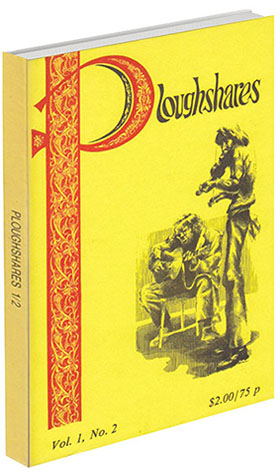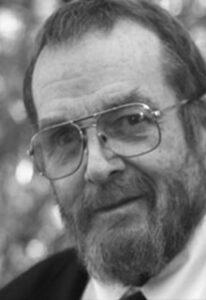rev. of David Johnson Passed Through Here by John Fairfield
. . .is a first novel, or first book, rather, full of good stuff, shaped loosely and roughly in the form of therapeutic reminiscence. There's a Writer at work in it, experimenting with styles, working for concision, profundity, and no-bullshit meatiness; now and then showing humor and relaxed gusto, now and then waxing into a trance-like, quasi-epical lyricism: always writing with a certain rough-hewn eloquence, if sometimes at cross purposes.
In form, the book bears superficial resemblance to Frank Conroy's
Stop Time: the thorn in the paw is a broken home and unloving mother; the life-long defense is running away (from school, from jobs, from roots) and/or finding temporary relief in mastered skills (building toys, inventing stories, chasing and scoring tail, and writing, ultimately). But if Conroy's sensibility resembles Salinger's, Fairfield's resembles — with as personal an authenticity — Hemingway's and James Jones's. Here is Hemingway, for instance:
. . .The gendarme came to the end of the bridge and started down the steps there. I watched him go all the way to the bottom of the stairs. Then I saw it. In the river, a body floated face down, snagged where the stone payement of the bank met the water. . .The gendarme knelt down on the edge of the bank and began trying to reach the girl. I turned and started down the long steps, and came to help him. It was hard to get a grip on her. Neither of us said a word. . .
They pull her out, the officer goes through her clothes, then discovers a piece of luggage "of good quality and new" under the bridge:
It had an SAB baggage ticket hanging from the handle. He opened the bag. The contents struck me. Inside were the clothes of a young girl, a couple of Norwegian sweaters, a pile of very feminine and lacy underclothing — bras, slips, and panties embroidered, or with a few flowers printed on them. Then as the middle-aged officer (perhaps himself the father of a girl her age) carefully searched through these belongings, he found a pair of girl's ice skates. They looked new. Perhaps never used. . .The gendarme looked up at me. . . "
Oui." That was all that he could say as he held the skates in his hands. He wore the croix de guerre.
(pp. 29-30)
Here, on the other hand, is James Jones:
There were fringe benefits being a beachboy at Ocean Street. . .[The] umbrella room had a peephole with a perfect view into an adjoining public shower for girls, and the peephole had been passed from year to year through generations of beachboys, some of whom approached middle age. You had a chance to look over the girls before they went down to the shower, and decide whether or not you wanted to follow them down. The girls that worked as waitresses in the hotel showered there too and watching them was all right. A girl that worked as a desk clerk used to masturbate in the shower, for a half hour at a time, so we found out how that was done. We also found out what old ladies looked like. But that wasn't as interesting. Except when they showered together. Unfortunately, that made one guy throw up once, which was a mess.
(p. 158)
The writer fails, however (perhaps predictably) to close his experiences (all that raw material, episodes, notebook vignettes, reveries) into any sort of satisfying frame. The attempt to frame it is there to be sure, but seems oversimplified and arbitrarily imposed. "I saw my mother's snarling face. . .I kept running from myself. . .they were making a child of me. . .I went crazy. . .a man can't run anymore. He has to face things, and himself": there is truth in these statements, and there might be dignity too, if they were earned; if they grew out of the narrative rather than seeming to be grafted onto it right out of R. D. Laing, Rollo May, or some other psycho-sociologist. Wisdom and self-perception don't organize much of anything here: David Johnson, the character, doesn't grow. Interest lags as experience replaces experience, as Paris replaces Boston or L.A. or Hobbs (New Mexico), without increasing tension or development: the mirror wanders with obsessive monotony, its
focal point unchanged: same terror, same frustration, same heartache, same tough, bluff exterior covering up the same old "daimon." The climax comes as anti-climax: just another (strong) episode — Johnson ends up in a straight-jacket, and is finally able to admit to himself that he hates his mother: but the book hasn't built towards this. What mother? We've heard about her off and on, had a couple of brief scenes with her: but we've had no chance to experience her really as more than a fish-wifey personification of Cruelty, Selfishness, Indifference. She hasn't come on stage for emotional reasons we might indulge in the suffering character, but not in the artist — which is one of the ways (however unfair the comparison)
Stop Time, Childhood or
Sons and Lovers are more remarkable triumphs over psychically painful pasts: they come to grips with the first cause, and give the reader direct access to it. If Fairfield is skittishly vague about his mother, he is equally vague about other details of his background: information simple enough to fill out on a job application (which Johnson hates to do), yet however pedestrian in kind, still valuable in identifying him to the reader as something more than a complex of emotions, values and a voice. Instead of a long, idealized account of his English ancestors, grandparents and timeless boyhood in Illinois (none of which has much bearing on the book), why not some plain facts — e.g. who was Father, what role did he play, when and how did he disappear, how long were they in Illinois, when the move to Boston, were they rich or poor, educated or ignorant? There's no real socio-economic information, no orienting chronology, some childhood, but no adolescence: and it would help, that's all. The
writer-character hasn't worked himself far enough out of the crude block of the NOW yet — i.e. his independent, self-scarred, rootless twenties (and then some). We're left guessing, to the extent that we care about him outside of the book.

